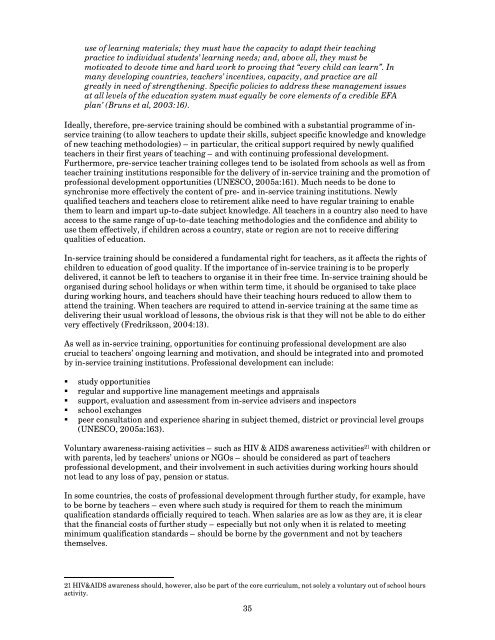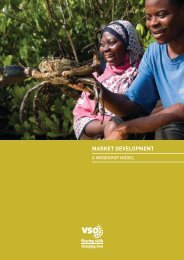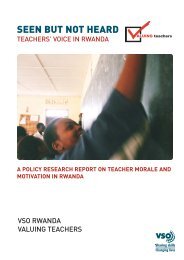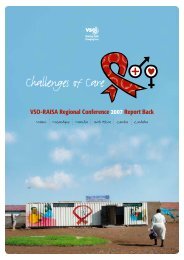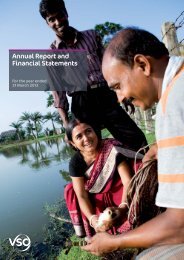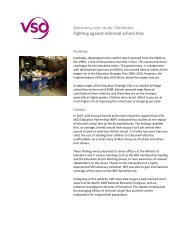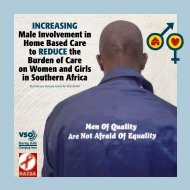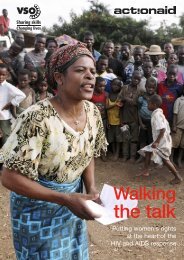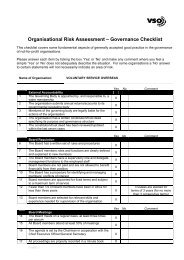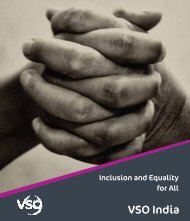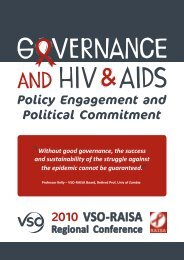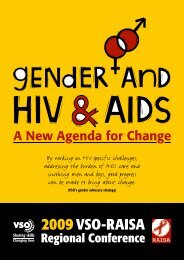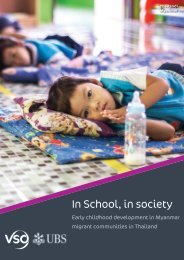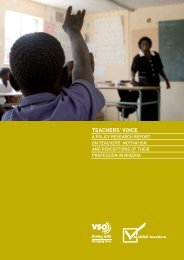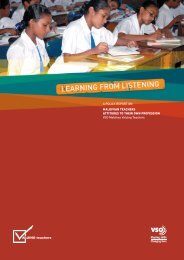Teachers for All â GCE policy briefing (566KB) - VSO
Teachers for All â GCE policy briefing (566KB) - VSO
Teachers for All â GCE policy briefing (566KB) - VSO
Create successful ePaper yourself
Turn your PDF publications into a flip-book with our unique Google optimized e-Paper software.
use of learning materials; they must have the capacity to adapt their teachingpractice to individual students’ learning needs; and, above all, they must bemotivated to devote time and hard work to proving that “every child can learn”. Inmany developing countries, teachers’ incentives, capacity, and practice are allgreatly in need of strengthening. Specific policies to address these management issuesat all levels of the education system must equally be core elements of a credible EFAplan’ (Bruns et al, 2003:16).Ideally, there<strong>for</strong>e, pre-service training should be combined with a substantial programme of inservicetraining (to allow teachers to update their skills, subject specific knowledge and knowledgeof new teaching methodologies) – in particular, the critical support required by newly qualifiedteachers in their first years of teaching – and with continuing professional development.Furthermore, pre-service teacher training colleges tend to be isolated from schools as well as fromteacher training institutions responsible <strong>for</strong> the delivery of in-service training and the promotion ofprofessional development opportunities (UNESCO, 2005a:161). Much needs to be done tosynchronise more effectively the content of pre- and in-service training institutions. Newlyqualified teachers and teachers close to retirement alike need to have regular training to enablethem to learn and impart up-to-date subject knowledge. <strong>All</strong> teachers in a country also need to haveaccess to the same range of up-to-date teaching methodologies and the confidence and ability touse them effectively, if children across a country, state or region are not to receive differingqualities of education.In-service training should be considered a fundamental right <strong>for</strong> teachers, as it affects the rights ofchildren to education of good quality. If the importance of in-service training is to be properlydelivered, it cannot be left to teachers to organise it in their free time. In-service training should beorganised during school holidays or when within term time, it should be organised to take placeduring working hours, and teachers should have their teaching hours reduced to allow them toattend the training. When teachers are required to attend in-service training at the same time asdelivering their usual workload of lessons, the obvious risk is that they will not be able to do eithervery effectively (Fredriksson, 2004:13).As well as in-service training, opportunities <strong>for</strong> continuing professional development are alsocrucial to teachers’ ongoing learning and motivation, and should be integrated into and promotedby in-service training institutions. Professional development can include:• study opportunities• regular and supportive line management meetings and appraisals• support, evaluation and assessment from in-service advisers and inspectors• school exchanges• peer consultation and experience sharing in subject themed, district or provincial level groups(UNESCO, 2005a:163).Voluntary awareness-raising activities – such as HIV & AIDS awareness activities 21 with children orwith parents, led by teachers’ unions or NGOs – should be considered as part of teachersprofessional development, and their involvement in such activities during working hours shouldnot lead to any loss of pay, pension or status.In some countries, the costs of professional development through further study, <strong>for</strong> example, haveto be borne by teachers – even where such study is required <strong>for</strong> them to reach the minimumqualification standards officially required to teach. When salaries are as low as they are, it is clearthat the financial costs of further study – especially but not only when it is related to meetingminimum qualification standards – should be borne by the government and not by teachersthemselves.21 HIV&AIDS awareness should, however, also be part of the core curriculum, not solely a voluntary out of school hoursactivity.35


